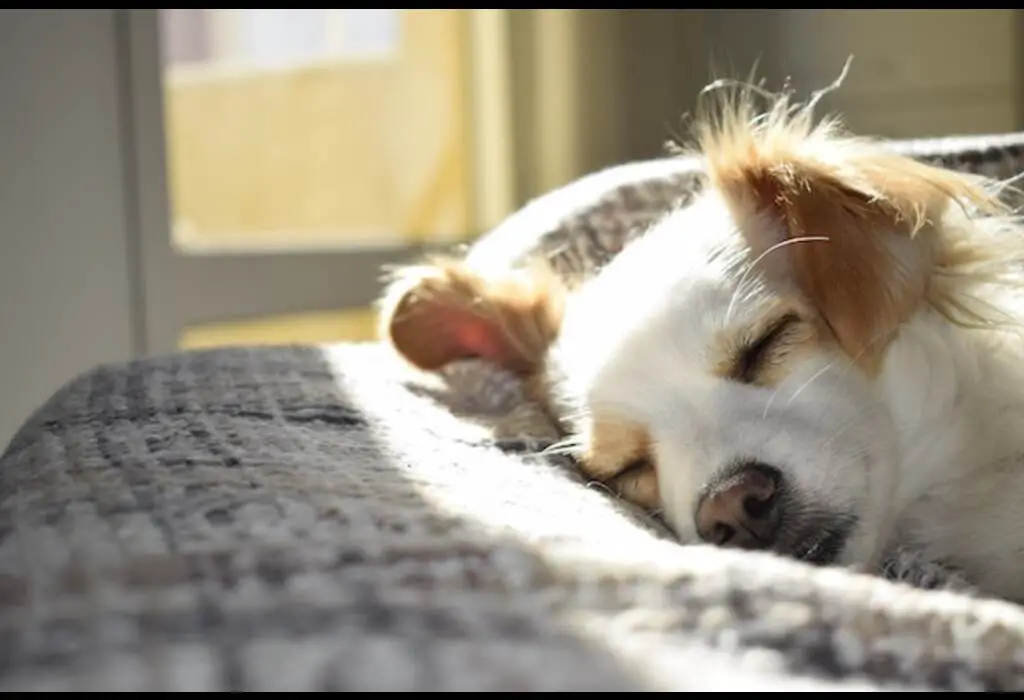Just like humans, small dogs need proper rest to maintain their health. But how many hours do small dogs sleep? The average sleep hours for small dogs can vary depending on a variety of factors, including age, breed, and activity level.
In this article, we will explore the importance of proper rest for small dogs and dive into their sleep patterns. By understanding the sleep requirements and habits of your furry friend, you can help ensure they are getting the rest they need to live a healthy and happy life.
Key Takeaways
- Small dogs generally sleep for 12 to 16 hours daily.
- Individual variations can occur based on age, health, and activity level.
- Puppies and older dogs may sleep more, while active breeds might sleep slightly less.
- A comfortable and quiet sleep environment contributes to their overall well-being.

How Many Hours Do Small Dogs Sleep
Small dogs typically sleep around 12 to 16 hours a day, though individual variations exist. Factors like age, health, and activity level influence their sleep patterns. Puppies and older dogs may sleep more, while active breeds might sleep slightly less. Ensuring a comfortable and quiet sleep environment supports their well-being and helps maintain a healthy sleep routine.
Small Dog Sleep Requirements
Small dogs have specific sleep requirements that are essential for their health and well-being. Similar to humans, restful sleep is vital for small dogs to maintain their physical and mental health, as well as their overall quality of life. By understanding their sleep habits, pet owners can create a comfortable sleep environment for their furry companions and promote healthy rest.
| Small Dog Sleep Habits | Small Dog Sleep Duration |
|---|---|
| Small dogs prefer to sleep for short periods throughout the day or take numerous naps. They also tend to be light sleepers and can wake up easily due to external stimuli. | The ideal sleep duration for small dogs varies based on their age and activity level. Generally, adult small dogs require 12-14 hours of sleep per day, while puppies and senior dogs may require more. |
Factors such as breed, health conditions, and lifestyle can influence small dog sleep patterns. Owners should monitor their pet’s sleep habits and adjust their routines as needed to ensure that they receive sufficient rest. Additionally, providing a comfortable sleep space and creating a consistent sleep schedule can promote healthy sleep patterns and improve the quality of life for small dogs.
Small Dog Sleep Requirements
- Small dogs require 12-14 hours of sleep per day on average, depending on their age and activity level.
- Puppies and senior small dogs may require more sleep than adult dogs.
- Light sleepers, small dogs may wake up easily due to external stimuli.
- External factors such as breed, health conditions, and lifestyle can influence small dog sleep patterns.
- A comfortable sleep environment and a consistent sleep schedule are essential for promoting healthy sleep habits in small dogs.

Small Dog Sleep Patterns
Small dogs may be pint-sized, but their sleep patterns are no small matter. Understanding their sleep patterns can help you provide them with the right amount of rest for optimal health and well-being.
Small dogs, like their larger counterparts, experience both deep sleep and light sleep. However, their sleep patterns can differ based on factors such as breed, age, and activity level.
On average, small dogs need between 12 and 14 hours of sleep per day. However, this can vary depending on their individual needs and habits. Some small dogs may prefer to take short naps throughout the day, while others may sleep for longer periods at night.
During the day, small dogs may take several short naps, typically lasting between 30 minutes to two hours at a time. They may also experience periods of restlessness or activity throughout the day.
At night, small dogs generally prefer to sleep for longer periods, often snuggling up with their owners or in a cozy bed. They may experience periods of light sleep, during which they may be easily awakened by noises or movements, as well as periods of deep sleep, during which they may be difficult to wake up.
It’s important to pay attention to your small dog’s sleep patterns and adjust their routine accordingly. Providing them with a comfortable sleep environment, including a cozy bed and calming music, can help promote quality rest and overall health.
Deep Sleep vs. Light Sleep
Deep sleep is characterized by slow brain waves, relaxed muscles, and slowed breathing. During this stage of sleep, the body works to repair and rejuvenate itself, making it crucial for overall health and well-being.
Light sleep, on the other hand, is characterized by faster brain waves and increased muscle activity. During this stage of sleep, small dogs may be easily awakened by noises or movements and may experience periods of restlessness or activity.
Understanding your small dog’s sleep patterns can help you create a sleep routine that promotes healthy rest and improves their overall quality of life.
Factors That Affect Small Dog Sleep
Several factors can affect the sleep schedule of small dogs. It’s important to consider these factors to create a routine that promotes healthy rest and meets their individual needs.
Age
Age can affect a small dog’s sleep needs and patterns. Puppies and senior dogs need more sleep than adult dogs. Puppies may sleep up to 18 hours a day, while senior dogs may require more frequent naps. As small dogs age, they may also experience changes in sleep patterns, including less deep sleep and more frequent waking up during the night.
Breed
Breed can also affect a small dog’s sleep habits. Some breeds, such as the Chihuahua and the Pekingese, are known for being light sleepers. Other breeds, like the Bichon Frise and the Shih Tzu, may have trouble regulating their body temperature during sleep, which can affect the quality of their rest.
Health Conditions
Health conditions can impact a small dog’s sleep schedule. Dogs with chronic pain, arthritis, or dental issues may have trouble getting comfortable and sleeping soundly. Dogs with anxiety or separation issues may also experience difficulty sleeping. If you suspect your small dog is experiencing sleep-related issues due to their health, it’s essential to consult with a veterinarian.
Consistency
Consistency is critical when it comes to small dog sleep. Creating and maintaining a consistent sleep schedule can help regulate their sleep patterns and promote healthy rest. This includes providing consistent sleeping arrangements, such as a comfortable bed or crate, and establishing a regular bedtime routine.

Sleep Duration for Small Dogs
Small dogs have different sleep needs based on their age and activity level. As a general rule, puppies require more sleep than adult dogs, with newborns sleeping for up to 18 hours a day. As they grow, an average of 14 to 16 hours of sleep per day is recommended for puppies. Adult small dogs typically require 12 to 14 hours of sleep a day.
The amount of physical activity your small dog gets can also affect their sleep needs. Dogs that are more active may require more sleep to recover and recharge. On the other hand, dogs that are less active may require less sleep since they are expending less energy. If you notice your dog sleeping more or less than usual, it may be a sign that their activity level needs adjustment.
To ensure your small dog gets the sleep they need, it’s important to provide them with a comfortable sleep environment. A cozy bed with soft blankets and pillows can help your dog feel more relaxed and secure, which can promote better quality sleep. Additionally, avoid disrupting your dog’s sleep schedule by keeping loud noises or bright lights to a minimum during their designated sleep time.
Small Dog Sleep Schedule
Establishing a sleep schedule for your small dog is important for promoting healthy rest. Here are some tips to help you create a sleep schedule that works for you and your furry friend:
1. Determine the ideal sleep hours
The ideal sleep hours for small dogs vary depending on their age and activity level. Puppies and senior dogs require more rest, while adult dogs may need less. For example, a typical sleep schedule for an adult small dog may be around 12-14 hours of sleep per day, with naps throughout the day and night. Consult with your vet to determine how many hours of sleep your dog needs based on their age and activity level.
2. Create a comfortable sleep space
A comfortable sleep space is essential for promoting quality rest. Provide your small dog with a cozy bed that is the appropriate size for their body. Make sure the bed is in a quiet and dark area of the house to minimize distractions and promote relaxation.
3. Establish a routine
Establishing a consistent sleep routine can help your small dog know when it’s time to sleep and when it’s time to be active. Stick to a regular bedtime and wake-up time each day, and try to keep meal times consistent as well. This routine will help your small dog’s body establish a natural sleep cycle.
4. Avoid disruptions
Avoid disrupting your small dog’s sleep schedule as much as possible. Try to keep loud noises and distractions to a minimum during their sleep time. If you need to wake them up during the night, do so gently and without too much commotion.
5. Incorporate exercise
Adequate exercise throughout the day can help your small dog sleep better at night. Make sure they get plenty of physical activity during the day and try to incorporate a short walk before bedtime to help promote relaxation.
By following these tips, you can help your small dog establish a healthy and consistent sleep schedule. Remember to consult with your vet if you have any concerns about your small dog’s sleep habits or if they are experiencing sleep-related issues.

How to Help Your Small Dog Sleep Better
Just like humans, small dogs can also struggle with sleep issues. Fortunately, there are several things you can do to help your furry friend get a good night’s rest.
Create a Comfortable Sleep Space
One of the first things you should do is create a comfortable sleep space for your small dog. This means providing a cozy bed with soft and supportive bedding and pillows. Make sure the bed is appropriately sized for your dog so they can stretch out and move around comfortably.
Provide Calming Music or White Noise
Some small dogs may benefit from having calming music or white noise playing in the background while they sleep. This can help drown out any disruptive noises and create a soothing environment for your furry friend.
Promote Relaxation Before Bedtime
Help your small dog unwind before bedtime by engaging in calming activities such as a relaxing massage or gentle playtime. Avoid overstimulating games or activities that may leave your dog feeling energized and restless.
Stick to a Consistent Sleep Schedule
Small dogs thrive on routine, so it’s essential to establish a consistent sleep schedule. Try to stick to the same bedtime and wake-up time every day, even on weekends. This can help regulate your dog’s sleep cycles and promote better quality rest.
Consider Consulting with a Veterinarian
If your small dog is still having trouble sleeping despite your best efforts, consider consulting with a veterinarian. They may be able to identify any underlying health issues that are interfering with your dog’s sleep and provide helpful advice on how to improve their rest.
The Benefits of Proper Rest for Small Dogs
Just like humans, small dogs require proper rest to maintain their health and wellbeing. In fact, a lack of sleep can have negative effects on their physical and emotional health, leading to issues such as obesity, anxiety, and even aggression.
By ensuring your small dog gets enough quality sleep, you can enjoy many benefits, including:
| Benefit | Description |
|---|---|
| Improved Mood | Proper rest can help regulate your small dog’s mood, reducing stress and anxiety, and increasing their overall happiness. |
| Increased Energy Levels | Adequate sleep can help boost your small dog’s energy levels, making them more active and alert during the day. |
| Healthy Weight | A consistent sleep schedule can help regulate your small dog’s metabolism, preventing weight gain and reducing the risk of obesity. |
| Strong Immune System | Quality sleep can also help strengthen your small dog’s immune system, reducing the risk of illness and infection. |
It’s important to monitor your small dog’s sleep habits and ensure they are getting enough quality rest. If you notice any changes in their sleep patterns or behavior, it’s best to consult with your veterinarian to rule out any underlying health issues.
By providing your small dog with a comfortable sleep environment, a consistent sleep schedule, and promoting relaxation before bedtime, you can help them achieve the many benefits of proper rest.

Conclusion
Small dogs have their unique sleep patterns, with most of them sleeping between 12 and 16 hours per day. Age, health, and breed play a role in determining the exact hours of sleep they need. As responsible pet owners, providing a cozy and peaceful sleep environment for our small canine companions supports their overall health and ensures they maintain a healthy sleep routine.
FAQ on Small Dog Sleep
Are you curious about your small dog’s sleep habits and patterns? Here are some common questions and answers to help you better understand your furry friend’s rest needs.
How many hours do small dogs sleep?
The average sleep hours for small dogs is around 12-14 hours per day. However, this can vary depending on factors such as age, health, and activity level.
What are some signs that my small dog is not sleeping well?
If you notice your small dog is restless during the night, has difficulty falling asleep, or is excessively lethargic during the day, these may be signs that they are not getting enough quality sleep.
Can small dogs have sleep disorders?
Yes, small dogs can experience sleep disorders such as sleep apnea, restless leg syndrome, and insomnia. If you suspect your small dog may be experiencing sleep-related issues, consult with your veterinarian.
Do small dogs dream?
Yes, small dogs do dream and can even experience sleep cycles similar to humans. During their rapid eye movement (REM) phase of sleep, they may bark, whimper, or move their legs as if running.
How can I create a comfortable sleep environment for my small dog?
You can create a comfortable sleep environment for your small dog by providing a soft and supportive bed, ensuring the temperature is comfortable, and minimizing noise and distractions in the sleeping area.
Should I establish a sleep schedule for my small dog?
Yes, establishing a consistent sleep schedule for your small dog can help promote better rest and overall health. Try to maintain regular sleep times and create a bedtime routine that promotes relaxation.
What should I do if my small dog is not sleeping well?
If your small dog is not sleeping well, try adjusting their sleep environment, establishing a consistent sleep schedule, and promoting relaxation before bedtime. If these efforts do not improve their sleep, consult with your veterinarian to rule out any underlying health concerns.


